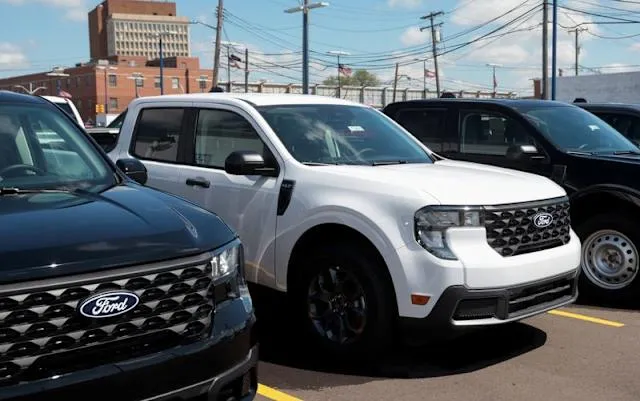Introduction
Ford Motor Company has recently taken significant steps to ensure the safety of its vehicles by announcing a recall that affects more than 273,000 units, including popular models like the Ford Expedition, Super Duty trucks, and Lincoln Navigator. With several concerning safety defects identified, the automotive giant has already begun notifying owners across the United States. This article delves into the details of the recall, the vehicles involved, and what owners need to know.
Understanding the Recall
The recall impacts a range of Ford vehicles manufactured over a specific period, particularly those made in Kentucky. The company has declared that the affected models may pose critical safety risks, which necessitated immediate action. Safety recalls are common within the automotive industry, especially when potential hazards are identified that could endanger drivers, passengers, or others on the road.
Details of the Safety Defects
Ford has reported that the recalls are primarily due to various defects that could impair vehicle performance. Some of the outlined issues include:
- Electrical System Failures: Some models may experience malfunctions in their electrical systems, potentially leading to loss of power while driving.
- Safety Belt Deficiencies: Defects in safety belts could result in inadequate restraint during an accident, increasing the risk of injury.
- Airbag Malfunctions: Issues with airbag deployment could prevent airbags from deploying as intended in an accident.
The comprehensive approach Ford is taking addresses these significant concerns, ensuring that safety remains a top priority in their operations.
The Models Affected
The recall includes a variety of vehicles, primarily focusing on:
- Ford Expedition: A popular choice among families for its spaciousness and performance.
- Ford Super Duty Trucks: Known for their rugged capabilities, these trucks are essential for many work and recreational purposes.
- Lincoln Navigator: The luxury SUV from Ford’s premium brand, valued for its comfort and features.
Specifically, the recall affects vehicles produced between certain years that meet the criteria for the outlined safety defects. Ford has stated that certain diagnostic tests have been conducted to verify these issues.
What Owners Need to Know
If you are an owner of one of the affected models, it is essential to take the following steps:
- Check for Notifications: Owners should check their mail and email regularly for correspondence from Ford regarding the recall.
- Visit the Ford Website: For detailed information, including the specific vehicles affected and recall notice, visit the Ford recall page.
- Schedule Repairs: Owners can contact their local Ford dealerships to schedule necessary repairs free of charge.
Furthermore, it is advisable to remain vigilant and monitor any changes to driving behavior, such as fluctuations in braking performance or warning lights on the dashboard. Reporting these symptoms could provide vital information that aids in fixing the defects.
Ford’s Response and Remediation Efforts
Ford has committed to assisting all affected vehicle owners generously. The company’s representatives have made it clear that they take safety recalls seriously and are dedicated to resolving issues promptly. As part of their remediation efforts, they are:
- Increasing Communication: Ensuring that owners are well-informed about the recall process and what they can expect.
- Implementing Solutions: Developing effective solutions to rectify the identified defects and restoring vehicles to the highest safety standards.
- Follow-ups: Conducting follow-up assessments to ensure repairs have been successfully implemented and to gather feedback from vehicle owners.
The proactive steps Ford is taking demonstrate their commitment to customer safety and maintaining trust with their clientele.
Historical Context
Ford recalls are not an isolated incident; the automotive industry has faced numerous recalls over the years as safety regulations become stricter and manufacturers are held to higher standards. This particular recall adds to a growing list of safety measures taken by Ford as they strive to maintain their reputation as a reliable vehicle manufacturer.
While recalls may seem negative, they also indicate a commitment to safety. By addressing leaks, defects, and potentially harmful issues, companies can not only enhance their product liability but also protect consumers from potential harm.
Consumer Advice on Handling Recalls
For Ford owners and consumers in general, understanding how to handle recalls is crucial. Here are some best practices to follow:
- Stay Informed: Sign up for recall notifications through the National Highway Traffic Safety Administration (NHTSA) and follow automotive news outlets.
- Document Everything: Keep records of all correspondence regarding recalls, including dates of notifications and repair appointments.
- Review Your Warranty: Understand your vehicle’s warranty and how it relates to recall repairs.
Awareness and knowledge can help consumers navigate the complexities of vehicle ownership, especially when recalls occur.
Conclusion
Ford Motor Company’s decision to recall over 273,000 vehicles, including popular models such as the Expedition, Super Duty, and Lincoln Navigator, underscores the company’s commitment to safety and accountability. As the automotive industry continues to evolve, the importance of safety recalls remains a critical conversation, highlighting both the responsibilities of manufacturers and the rights of consumers. Owners of these affected vehicles should not disregard notification letters or neglect the importance of rectifying safety defects; taking action could ultimately save lives and prevent injuries on the road.







